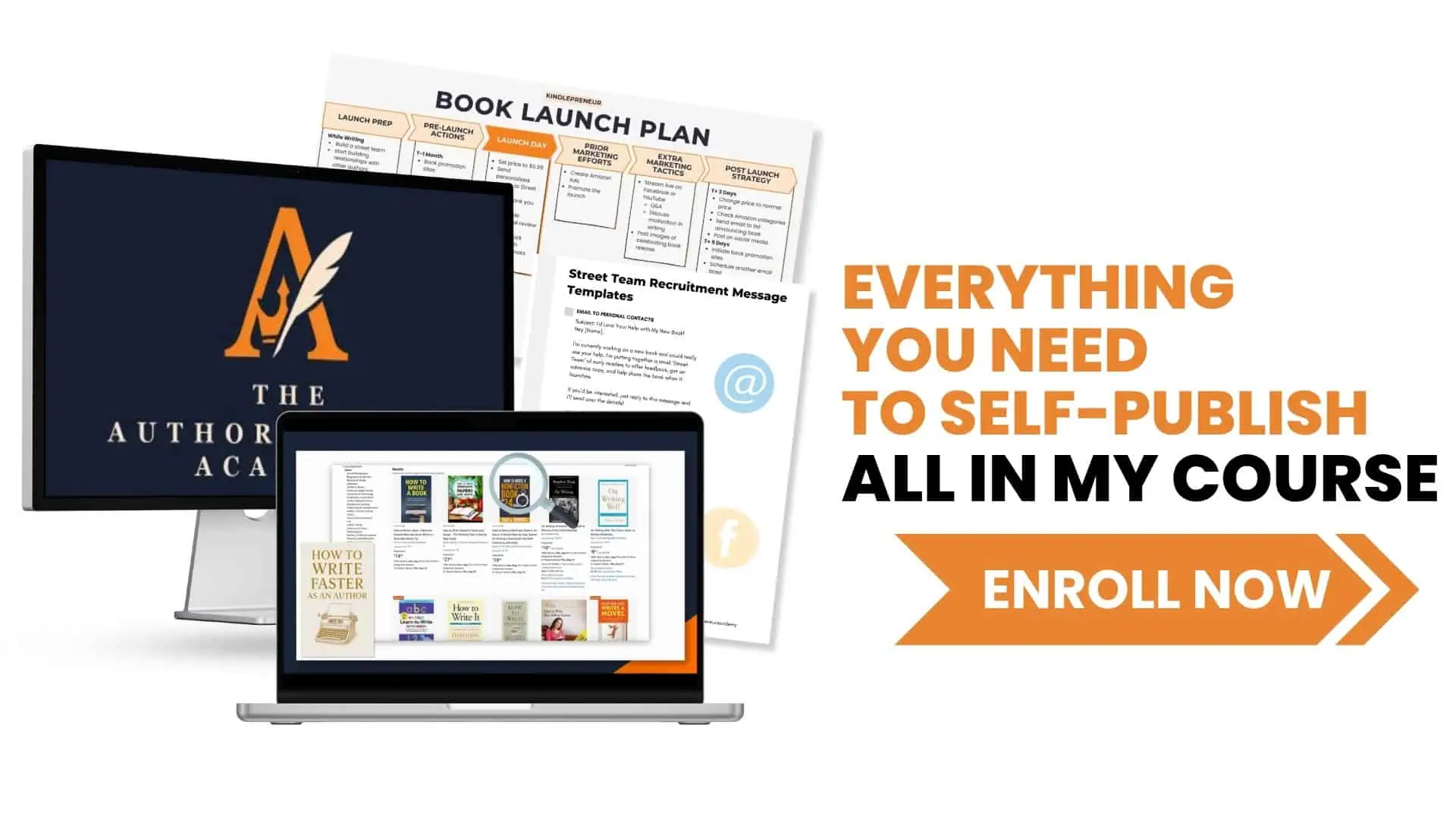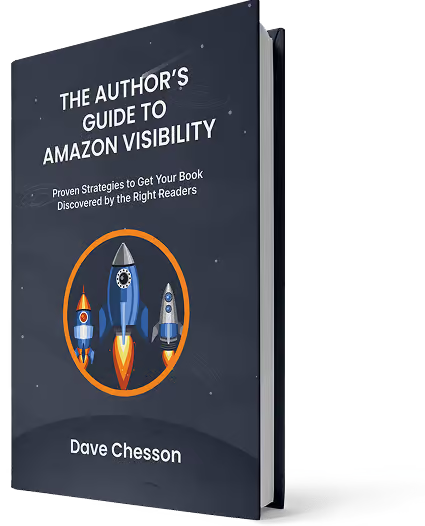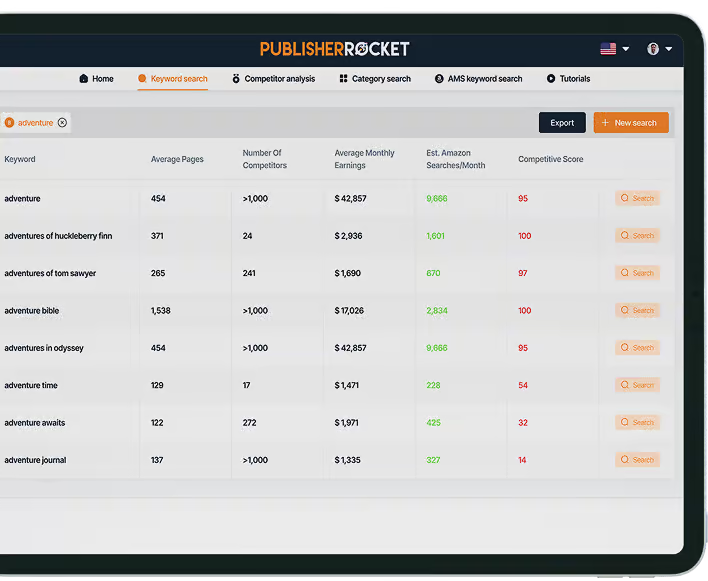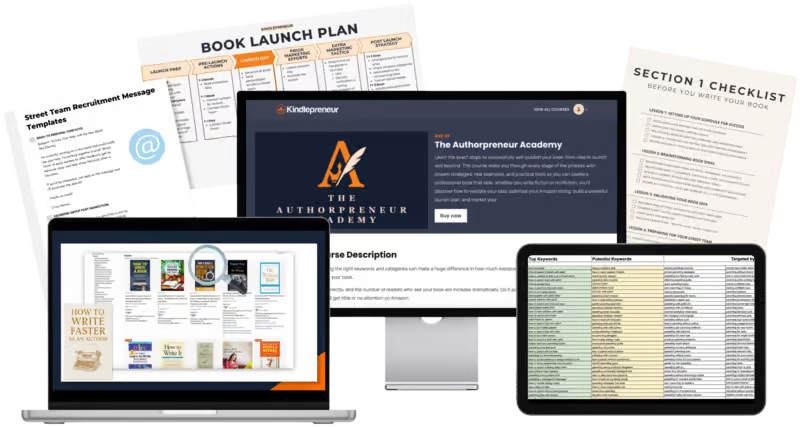Wouldn't you love to increase the number of times your book is shown on Amazon?
To boost your book’s rankings so it shows up sooner and more often in searches?
Most self-publishers know that the keywords you choose play an important role when it comes to showing up for certain searches. However, knowing what to do with keywords can get complicated.
Amazon presents us with seven boxes in which we can enter our desired target Kindle keywords. In each box, we can use up to 50 characters, which allows us to either put in a particular target phrase we want to rank for or fill up the box to include as many phrases as possible.
Some book marketing gurus argue that you should use up as many of the available characters as possible, while others believe you should only enter a target phrase. This conflicting advice has left lots of authors scratching their heads, wondering how to actually approach their Kindle keywords.
Well, in this article, I’m going to use data we gained from experimentation to provide the most optimal way to fill in your seven Kindle keywords.
This will give you the best strategy going forward and answer some other questions we tackled through this experiment. By using this technique, you will not only increase how many times your book is shown, but also increase your book’s rankings in Amazon for your target keywords.
- How to select the best keywords for your book
- How to fill in your keywords in KDP
- Mistakes that might be killing your keyword strategy
Below I will detail my data approach and the experiment we conducted to get the information, but if you’d like to just skip that and get straight to the part that talks about what the findings show and what you should do, then click here.
What are the 7 Kindle Keyword Boxes?
Before we dive into how to approach your keywords, let’s first look at what those 7 Kindle keyword boxes are (in case you're unfamiliar with them):

Each author is allowed to input their target keywords into 7 boxes. Each box allows for a maximum of 50 characters.
This has left authors wondering:
“Should I fill in all 50 characters per box, or should I only target one particular phrase regardless of whether I have filled in all 50 characters or not?”
In other words…
Is it better to be more targeted or more broad with your keywords?
Here at Kindlepreneur, we built out an experiment to find the answer to this question. I'll explain how that worked in just a moment.
Terminology For This Article
Before we go further, it might be useful to first define some of the terminology I will use throughout this article:
Keyword boxes: These are the seven Kindle keyword boxes where you get to choose the keywords you want your book to show up for.
You can find these seven boxes in your Kindle Direct Publishing account when you are either editing an existing book or uploading and publishing a new book.
Amazon Search Result Page: When someone types in a phrase into Amazon's search box, Amazon then presents them with a list of products. These are called the Amazon Search Results. If your book shows up on this page immediately, then we say that it is listed on the first page of search results.
If, however, you need to click to see the next set of results, then we call this the second page of search results, and so on. Google SEO'ers will shorten/abbreviate this phrase and call it the “SERPs” for Search Engine Results Page, and I've seen some book marketers use this phrase as well when talking about Amazon.
When I personally have a high-level conversation with a publishing company or another marketer, I call them SERPs too.
Indexing for a Keyword: For the purposes of book marketing, indexing for a keyword is when you convince Amazon to list your book for that keyword phrase. It doesn't necessarily mean you show up on the first page of the Amazon search results, it just means Amazon acknowledges your book should be listed for that search phrase and you will therefore show up somewhere in the search results for that keyword.
If Amazon has listed 11,041 books for that search result, and you are now ‘indexed' for that keyword, then there will be 11,042 books listed in total for that search result.
Ranking for a Keyword: In a previous definition, we discussed that Amazon Search Results is a listing of products shown after a customer does a search. The rankings for that phrase or keyword the customer typed in is the number at which the product shows up.
So, say for example someone types in “War Mage” and your book is the 7th book shown on the search results, then you have a ranking of 7 for that keyword phrase. If you rank #100 however, that means the shopper would need to go through many search results pages in order to see your book as the 100th book listed for that keyword.
Rankings are very important because, as you can see from the below graph, the book that ranks #1 for a keyword gets the most clicks by a huge margin.

The Experiment with Kindle Keywords
To do this experiment, I needed two things:
- Volunteers willing to submit their current keywords and be willing to change their keywords
- To build a specialized crawler to find keywords and whether books are indexed for it and where they rank
For the volunteers, I emailed the Kindlepreneur email list and got an AMAZING response. In the end I choose 120 books with 82 being fiction and 38 being nonfiction. Each author submitted the current keywords they have listed in the 7 boxes. We marked whether or not the author had used the strategy of filling in as many of the characters as possible or was specific with their keyword phrase choices — or some combination of the two.
I then utilized a special crawler that the Publisher Rocket development team created just for this experiment.
The crawler was designed to rapidly go through thousands of genre and topic specific keywords, Amazon suggested keywords, keywords in their title and subtitle, and the listed keywords that fit our 120 volunteer books. Then it would index whether or not it found any of the volunteer books and at what rank (up to 300 since that is a far as we could financially go).
We then ran the crawler for days to ensure that over 100,000+ keyword possibilities were checked.
Once we had our data, we then had the volunteers change their data depending on whether or not they used the full box strategy or the specific strategy. Afterwards, we ran the crawler again and marked the changes in results. We even went further to check if there was a decay of rankings or not over time.
For the Statistician Friends Out There: I know, I know…120 books is not perfect for generating statistical proof and the standard deviation and sample size are not ideal. However, I'd request that you keep in mind the results were pretty sound to allow for such conclusions, and it was all we could afford to run considering this was a very expensive experiment.
I'll go over 6 of our findings below, but first, let's talk about what you can actually DO to get your 7 Kindle Keywords…
So, Here is What Authors Should Do
It’s apparent that when you have more keyword phrases in the box, you rank for more things, but you also have a lower rank for those phrases.
Step 1: Find 1-3 Keyword Specific Phrases
These 1-3 keyword phrases need to be:
Very relevant to your book: Think of them as the perfect descriptive phrase your target reader would type into Amazon when searching for your book.
Examples: How to lose weight fast, Gaslamp supernatural romance, Evernote for authors, military scifi space marines. They read like real terms, and truly fit your book.
Have shoppers looking for them: Since we’ll be burning a couple of our seven boxes for these phrases, they NEED to actually have people searching for them. This is where Publisher Rocket’s Amazon Searches Per Month number is SUPER important. Don’t waste your boxes on something that has no shoppers searching for it.
Not overly competitive: On Publisher Rocket, the competition score is a number from 1-100 which tells you how hard it would be to rank for that keyword. In essence, if you’re using one keyword box for that term or phrase, you might want to ensure you can actually rank for it and thus benefit from it.

If you find 1-3 phrases that exude these three characteristics, then I'd absolutely recommend using a specific box for each.
Step 2: Find 1-2 to Target Specific Categories
A newer strategy we've implemented, based on changes Amazon has made to the category selection process, is to use at least 1-2 of your 7 keywords to target or reinforce your choice of categories.
Here's what that looks like:
First, you can search or scroll through Publisher Rocket's list of categories. From there, you will see a button on the far right that says “keywords”.

Note: This feature is ONLY available in Publisher Rocket. Amazon does not make this information public.
Next, Rocket will give you a list of words that describe that category. Find a handful that you can use, or even combine, to place as 1-2 of your 7 keywords.
They can even serve as great inspiration for other keywords that you'll want to use in steps 1 or 3!

You may have already selected your categories already, but since Amazon now only lets you select three categories, it's important to use Keywords as a way to fortify those category selections, and possibly even get Amazon to place you in more categories.
You see, Amazon reserves the right to place you in as many categories as they see fit. Just because you selected three doesn't mean you will get to keep those three. And Amazon could also even include your book in more than three.
So, to maximize the number of categories you could rank for, as well as to ensure Amazon doesn't take your book out of any categories, I would use at least two of your seven keyword slots to use category-specific keywords.
Step 3: For the Rest, Fill in With Niche Specific Terms and Phrases
I believe that for the rest of your boxes, it would be best to fill in as many of the 50 characters as possible with words or phrases that fit your type of book.
These would be broad terms that fit your niche or genre but aren’t as important because the chances that someone would type them into Amazon and you’d be the exact type of book they are looking for would be small.
Here are some things to help you figure out how to generate those words.
For Fiction create a list of words that Describe:
- Your character or their role
- The Setting and Time of the story
- The Catalyst that kickstarts your story
- Your genre or the flavor of your genre (steamy romance vs wholesome love vs erotica, etc)
- Synonyms of the above
For Nonfiction create a list of words that Describe:
- The pain points of your target reader
- The success your reader hopes to gain from your book
- The type of reader or their demographic
- Descriptive words
- Synonyms of the above
If you follow these steps for each, you should not have a problem at all coming up with multiple 50 character boxes and should help to increase your book's indexing on Amazon.
6 Questions Answered By the Experiment
Here are some of the questions we were able to answer thanks to the experiment results:
1. Does Filling In All 50 Characters Index Your Book For More Keywords?

Based on our findings, the answer is clearly yes. We found that the more words or phrases you entered in the Kindle box, so as to fill in as much of the 50 characters as possible, the more your book was indexed for. Which leads us to our next observation…
2. Does Amazon Rearrange the Words and Index for them or just use the exact phrase you type in?

It turns out that Amazon does use all variations of the words you enter as you can see from the diagram above. Therefore, if you typed in “Dragon War Mage” into one of the 7 keyword boxes, you would also be indexed for War Dragon Mage, Mage Dragon, War Mage, Mage, and all other versions of the phrase. This is a major reason why our graph above shows an almost exponential increase in words indexed as you move to the right.
This makes a lot of sense since Amazon specifically tells people to not put quotation marks around your phrase, or else you will only show up for that exact phrase and nothing else. In boolean search criteria, if you ever want to only be shown an exact phrase, put quotations around it. You can do this on Google the next time you only want to see results based on exactly what you type, and no subsets of it. Looks like Amazon's search engine (and thus their indexing) works the same way.
However, it is important to note that Amazon only indexed the books for terms they deemed legitimate — terms that would actually produce results if you typed into Amazon. So, if one of the combinations of the phrase is something that Amazon doesn't acknowledge or show books for, they won't start ranking you for it either just because you had it listed. Apparently they are smarter than that.
Also of important note, Amazon includes pluralizations of the word automatically and so we found that you also indexed for the pluralizations of most of the phrases as well.
3. If I have the Same Keyword More than Once, Does that Help or Hurt?
Amazon makes it clear that you should avoid reusing the same keyword that shows up elsewhere in your book's metadata (title, contributor, etc). If you were to click the link above your 7 kindle boxes that says “how do I choose keywords” (see above image of the keyword boxes to find the link), you'll see this popup:

So, does it hurt us if we do repeat words? Will this be something Amazon penalizes us for?
The answer to both is no. From our findings, authors did not get penalized for reusing a keyword that is in the title, subtitle or elsewhere. They also didn't get penalized if they had the same keyword in different boxes. But we also found that it didn't help either. Having the same keyword in the title and in different boxes didn't mean you got better rankings.
BUT, I wouldn't avoid using the same keyword in another box if it fits in a specific phrase you have. Say for example you have two phrases that you want to target for your book. Thanks to your research using Publisher Rocket, you know there are specific Amazon searches per month for both and low competition. One is War Mage, and the other is Fantasy Mage. I wouldn't remove the word “Mage” from one of them just because you used it already in your title or in another keyword box. In the next question, you'll find out why.
4. Does Targeting a Specific Phrase Help With Rankings?
Amazon specifically says that the degree of text match plays a major part in rankings. This is our first indication that the more specific you are in the 7 keyword boxes, the more likely you are to rank for those target phrases.

Our experiment also showed the same. We found that the more specific you were for a particular keyword phrase in the keyword box, the higher you'd initially rank for that phrase in Amazon search results on average. So, while Amazon does rearrange the words and index them for you, the way you put them into the box has a stronger affect than a random combination of them.
In the graph above, you can see a 300 dashed line. That's because in our experiment, our special crawler would only check the rankings up to #300. It was a very costly process and to go above that number would have cost us a LOT more time and money. Sorry for the limitation, but looking at the data, I think we have enough to make a more solid decision here.
5. Is it Better to Put My Keyword in the Title and Subtitle, or the Keyword Box?
The short answer is yes, it is better to put your keyword in the title or subtitle. We saw an increase of 37% in rankings when someone had the phrase in the title or subtitle, compared to if it was just one of the phrases in a keyword box. This makes sense considering what is in the title or subtitle is a better indication of what the book focuses on. However, this is NOT a recommendation to keyword stuff. It only shows that those two spots have a larger effect on rankings than your 7 keyword boxes.
6. One Last Thing: Two Anomalies that I Think Tell Us Something
We had two anomalies that I think require bringing up. Both could tell us something, however, I caution making it a fact since both only happened once and do not constitute a statistical proof.
The first is that, while all the other books indexed for most combinations of their keywords in the 7 boxes, one particular book did not. My guess on why is that when I looked at the individual keywords, they were…how should I put this…extremely (and I mean extremely) risqué. I have a feeling that Amazon just didn't allow for such words to have results and this caused such phrases to not index.
The second book also didn't index for ANY of its target keywords. However, when I looked at the specific book, and the keywords listed, it was obvious that these keywords were not the right keywords for the book. When I contacted the author, they realized they entered the wrong phrase into Amazon because they were uploading a bunch of books and copied the wrong phrase for the wrong book….whoops.
But I think this is a VERY valuable lesson: Amazon knew from the other information about the book (metadata) that those keywords did NOT belong to that book and therefore didn't index that book for those terms. I believe this means Amazon doesn't just blindly take what you enter here, and list you. Instead, it looks at everything else and, based on that data, decides if you really are a book that should show up for these things. I'd like to experiment with this is the future to have more statistical proof, but I think it's a fair assumption based on logic and results from this one particular case.
So, what should authors do about this considering that more words do get your book indexed more, but more specific phrases get better rankings?

Want more videos like this? Then click HERE to subscribe to my YouTube channel
Conclusion
As you can see, the more words you put into the boxes, the more you will index for on Amazon. But, at the same time, you’ll weaken your overall rankings for those terms since their power will be diluted.
Through this experiment, we now see that authors should use a combination of the two tactics where they target specific words or phrases that best fit their book, but also reserve certain keyword boxes for including the other terms and phrases not included. This will give you the most optimal rankings and indexing so you can get your book found by readers.
Of Important Note: The crawler I discussed in the experiment was something I was hoping to employ for Rocket users, where we could help authors see how many words and phrases they index for and what their rankings are. However, even after months of madness, I could never get the operations to be cheap enough to make it a viable option. Sorry guys…we tried and will keep trying. As Rocket users are accustomed to, I'm always working to add to Rocket and make it better and better…but sometimes we have test flights that just don't make the light of day.
Cheers,






